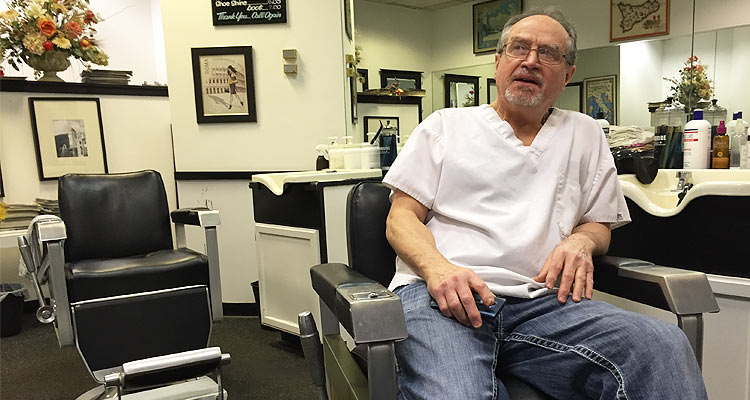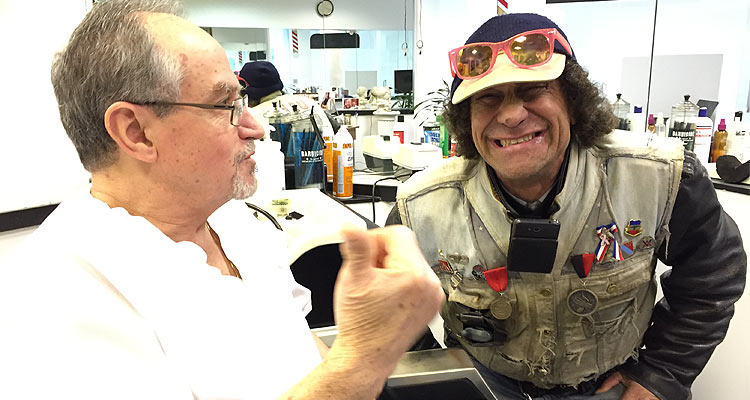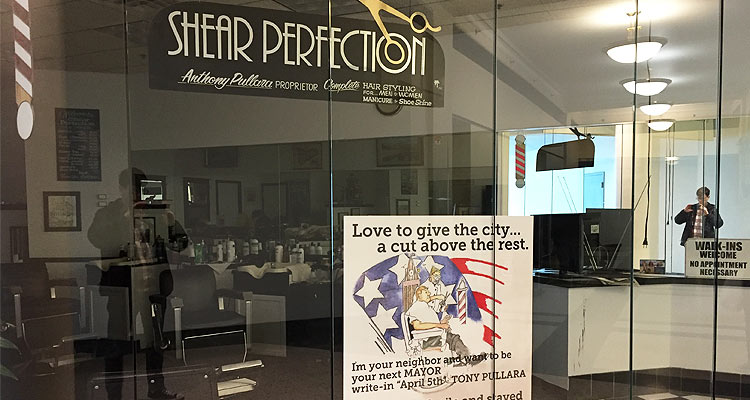Tucked away in a far-off corner of the cavernous Shops of Grand Avenue, above the T.J. Maxx and facing the second-story Chase Bank skywalk, is a barbershop called Shear Perfection. Floor-to-ceiling windows reveal a small, simple shop with a handful of chairs and a cardboard barbershop pole subbing for the real thing. It’s not a bad spot for a business, really: The skywalk is an ant farm of activity during weekday lunch hours, carrying hundreds of downtown workers to the mall’s still-thriving food court. If you happen to have a few extra minutes, a quick shave and a haircut couldn’t hurt. Maybe a shoe shine. And with a name like “Shear Perfection,” how could you go wrong?
But it’s not a weekday and it’s not a lunch hour and the mall is dead. It’s a Sunday and my wife and I are taking our toddler-age daughter on another in a long series of Grand Avenue walking tours—a.k.a. It’s Still Cold Outside So Let’s Let This Fucking Kid Blow Off Some Steam In A Mostly Empty Downtown Mall. My wife is downstairs browsing the aisles of T.J. Maxx while my daughter and I race and tumble and explore the empty skywalk above. It’s here that I spot a sign in the darkened window of Shear Perfection, a sign full of oddly poetic line breaks, a few hand-drawn quotation marks, and at least one flagrant typo:
Love to give the city…
a cut above the rest.I’m your neighbor and want to be
your next MAYOR
write-in “April 5th” TONY PULLARA“Do it with a Smile and stayed [sic]
tuned for a better tomorrow.”Make Milwaukee Friendly
“No Horse-Sense…
Just Good-Sense”SHEAR PERFECTION
I stare at the sign, dumbly, soaking it in. Somewhere behind me my daughter tears ass across the skywalk, giddily unsupervised. I don’t care. I keep staring at the sign, staring at the words, staring at the drawing of a bespectacled barber and a curiously coiffed client framed by the American flag and Milwaukee City Hall. “Make Milwaukee Friendly.” “No Horse-Sense…Just Good-Sense.”
Twenty-four hours later I’m on the phone with the proprietor of Shear Perfection, Tony Pullara. “This is real,” he says when I ask him about his mayoral bid. “Can you stop by this afternoon to talk?” I’m on the bus in seconds.
Tony Pullara was born in Sicily in 1948 and immigrated to the United States when he was 12 years old. His uncles had the power to decide where he and his mother, their sister, would live in the U.S., and they eventually settled on Milwaukee. Newly installed, Pullara attended elementary school at Saint Rita Church on Cass Street. Due to a cross-continental mix-up, he was mistakenly bumped up a grade and was subsequently still learning English well into high school.
After graduation, Pullara went back to barbering, a trade he had practiced as a young boy in Sicily. (His first test subject was his brother-in-law.) He landed his first job in 1967 at Tate’s Barber Shop on S. 8th Street and W. Windlake Avenue. From there, a job at Peter’s Barber Shop on Brady Street led to a job at the Pfister Hotel, which led to a lengthy stint at Marine Bank. In 1983, Pullara struck out on his own and opened Shear Perfection. He’s been in the skywalk of the Grand Ave. since 2008.
“My education has been more hands-on,” he tells me. “I learn. I’m learning as I’m talking to you.”
Pullara is indeed talking to me, reclining in one of his chairs at Shear Perfection, peering out at the irregular stream of mall-walkers. I have no doubt he’s learning, too: At 68 years old, Pullara has a strange way of cracking a smile and raising an eyebrow when he speaks, as if he’s about to bullshit you. And it’s hard not to think he’s bullshitting you when, after being pressed about his mayoral campaign, he says things like, “This is my journey. My journey continues on. I choose to continue on with my vision and my ideas.” I offer a soft and knowing chuckle. His smile fades and his eyebrow drops. He looks disappointed. He’s testing me. He’s serious. He really wants to be mayor.
“I want to bring back Milwaukee in the most positive way,” he explains. “The best way to get to that point is to go back to simplicity in life. Many years ago, when I was a little boy, kids could touch the police officer, or the priest, or the teacher in a positive way. Now, you’re being chased by the police officer with a gun. It’s wrong.
“I want to build the community and the neighborhoods back,” he continues. “As a child I played on the Cass Street playground. There were kids everywhere. You don’t see that no more. There are so many neighborhoods that are deserted. What are you going to do, plant corn?”
A fair question, though Pullara is unclear as to how, exactly, he plans to realize his rosy “Make Milwaukee Friendly” vision. But he’s trying: The sign in his window was designed by a longtime Shear Perfection client, Mr. Johnson. (“He was so proud” of the final product, Pullara says.) Another friend made 500 flyer-sized photocopies of the sign and helped Pullara hand them out during the spring primary election back in February. A woman who works in the mall’s Boost Mobile store, meanwhile, helped Pullara create a Facebook page. “This is not a job for a single person,” he says. “It’s who you have around you. If you have the right people around you, then things will get better.”

But there’s more to Pullara’s mayoral motivation than just idyllic neighborhoods, helpful mall cohorts, and touch-able cops. It’s personal. In addition to being a longtime barber, Pullara is a longtime landlord. He owns a handful of properties throughout Milwaukee and has been struggling with the city, the courts, and problem tenants for decades. It’s a sore subject that dominates our conversation.
“If you only knew how many trips I’ve made to the municipal courts,” he says. (A cursory glance at the WCCA website confirms that Pullara is indeed no stranger to the system.) “When people create damages, and you fix, and they create more damages, eventually it becomes overwhelming. Just the rent alone doesn’t cover it. I’ve been paying penalties after penalties after penalties for years. How do you recover that way, when the city should be there to help us? We are the homeowners. Instead, it hasn’t been that way.”
Pullara says he has nothing but respect for the mayoral race’s two frontrunners, incumbent Tom Barrett and Ald. Bob Donovan, but he claims they’ve done little to help him or the community with nagging real estate problems. “Now you’ve got empty lots. Who’s gonna pay the taxes? Mr. Donovan says he’s going to do it on the spectators, the people that come, visitors, the tourists. I say, you don’t do that. I’d rather legalize marijuana and let that pay. I said that in 1969, or ’70, or ’71. You should legalize. Then you control.
“People are focused on the skyscrapers, the streetcars,” he continues. “I’m sorry, I’d rather make Downtown Milwaukee walking-friendly. I would put bricks in the roads. Slow down, folks.”
The streetcar, downtown, and marijuana legalization dutifully covered, Pullara continues to harp on his struggles with the city. “In the future, municipal courts should not be used for landlords only. When the city gets involved—and they’ve been involved in such a big way, because they make money. People create damages, penalties, courts, landlord versus municipal. If [Milwaukee County Circuit Court Judge John] Siefert was here in front of me, I’d say, ‘Come in here, I got a dish of spaghetti for you. No sauce.'”
I find myself nodding politely throughout most of Pullara’s spiel, which grows more and more personal and protracted as time goes on. (The “no sauce” burn makes me laugh, though.) Still, he’s a strangely charming and sympathetic character, a prototypical working class barber skilled at simultaneously cutting your hair and talking your ear off. We move on to a host of other topics: Pullara’s relationship with his children and grandchildren (“They miss me. They’re all so far away,”) his relationship with Barrett and Donovan (“Mr. Barrett, I truly respect. I respect Mr. Donovan, too. I respect everybody at City Hall. They just don’t have time for me,”) and the future of the Grand Ave. (Pullara says he approached Danny Gokey about performing a concert there with his daughter, who sings). It’s kind of hard not to like the guy.
“Mr. Barrett and Mr. Donovan, they’re running too fast, and one of them is going to stumble,” Pullara says, summing up his campaign. “And I’ll be walking right there behind them.”
Good. Perfect. Got it. I’m about to say my goodbyes when a man who looks and sounds like a Muppet gone to seed bursts through the door, speaking Italian. Pullara is thrilled to see him. The man wears a dirty vest adorned with dozens of random pins and medals. Frizzy hair juts out from under a baseball cap topped with tinted hipster sunglasses. A cell phone sits in a holder around his neck, harmonica-style. He’s the kind of guy you recognize from the sidewalks in front of places like the Grand Ave., and the kind of guy who opens conversations with semi-intelligible arguments against Syrian refugees—which is exactly what he does.
“We just have one too many of them,” he says, apropos of nothing. “We have this activity of the terrorists in California. In San Bernardino. Everything’s getting worse. We already have an agitated country, and our soil is filled with terrorists of all kinds.”
The man eventually introduces himself as Vice (“Just like vice squad!”). He tells me he’s just come from an undisclosed university where he “had a little bit of discussion” with the students, and that he frequently drops by Shear Perfection to shoot the shit with Pullara. As Vice rambles on about refugees, Donald Trump, sympathetic pro-life protestors, and something about two computers that hold all of the world’s data, Pullara beams with glee, occasionally flashing me a look that says, “See? This guy gets it!” I’m growing concerned.

And suddenly we’re talking about Sheriff David Clarke, because of course we are. “I’m politically acclaimed,” says Vice. “We have to make sure we’re going to elect someone who is as politically acclaimed as the commander in chief of all the deputies, David A. Clarke. He’s honest, integrating forward.”
“See?” says Pullara. “Bravo!”
Vice: “When we elect David A. Clarke and they legalize cannabis here, all the proceeds are going to take care of cameras in all the neighborhoods and schools. We’re probably going to have more police, and all the angles are going to be covered, but more studies have to be performed, and the students have to be fully addressed of this objective because they get involved a lot in what’s going on in developing countries.”
Pullara: “Exactly, exactly. I want David Clarke to ride a horse! He’ll take care of things from the horse, and we’ll take care of things from the ground, walking. Kids will be able to pet the horse. There will be strength from him riding it!”
Vice: “This mall is a military compound that used to be my haven for skateboarding in the basement. I grew up here. All my life I stayed from twelve until three in the morning skateboarding down there where the hanger of the chopper is. And submarines used to surface right in the river. And the tugboat used to bring in the choppers…”
My polite nods are running out and I only have so many “yeah”s and “uh-huh”s left in me. When Vice suddenly takes his leave with a “Ciao!” and Pullara exclaims “Now you know what our beliefs are!” I know it’s time to go.
But before I do, Pullara directs my attention to a small, unassuming painting tucked away on the back wall. It’s a painting of his hometown in Sicily, Vicari. Pullara stares at it for a few moments, quietly. Then he tells me about a man who lived there, a man who is now “up in heaven.” “He was my teacher, he was a father, and he was the mayor,” he says.
The mayor! Of course! It all makes sense now. So, I ask Pullara, did this man, this teacher, this father, this mayor inspire you to run for mayor yourself all these years later? Was this something you were destined to do? To set up shop in an empty mall, cut hair, put a sign in your window, and eventually make Milwaukee friendly again?
Pullara cracks a smile, raises an eyebrow, and leaves it at that.

